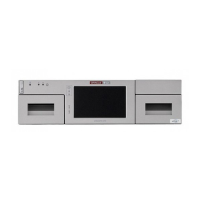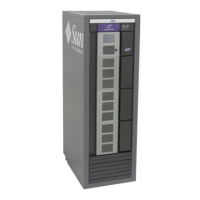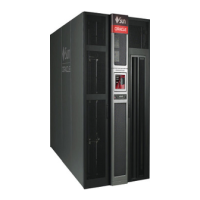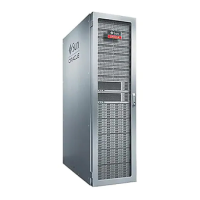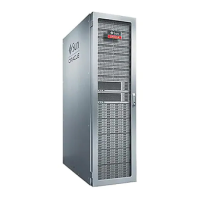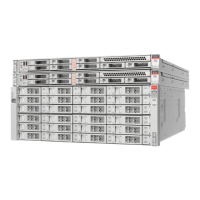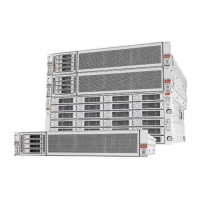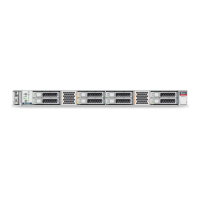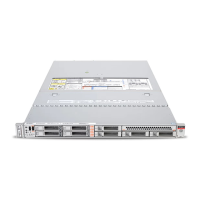Do you have a question about the Oracle StorageTek T10000 and is the answer not in the manual?
Describes the intended readers of the document.
Provides information on Oracle's accessibility commitment.
Describes the T10000 tape drive, its cartridges, and libraries.
Details items on the rear panel of the library tray.
Discusses the recommended use of interface ports for tape drives.
Explains the use of the Ethernet maintenance port for service calls.
Shows the rear panel of the SL3000 library drive tray for the T10000D.
Explains the meaning of drive tray indicators.
Describes the rear panel of the SL8500 library drive tray for T10000A, B, or C.
Details the drive status indicator states and meanings.
Explains the encryption status indicator for encryption-capable drives.
Covers data-at-rest encryption and FIPS compliance.
Discusses StorageTek Crypto Key Management Station and KMS.
Explains the DPKM subsystem for host-based key management.
Describes communication with library-attached drives via VOP.
Discusses manual operations via VOP for library drives.
Describes operation of rack-mounted drives via operator panel or VOP.
Focuses on secure network configuration for VOP.
Introduces the SLC GUI for basic drive information.
Describes the common read/write data cartridges.
Explains the special-use diagnostic cartridges.
Describes the lower capacity Sport cartridges.
Details the write-once VolSafe data cartridges.
Explains the use of cleaning cartridges for drive head cleaning.
Discusses information recorded on cartridges for access and life management.
Reflects cartridge use and activity information.
Describes the map used to locate customer data on tape.
Explains MIR processing for mixed T10000 drive models.
Lists media invalid conditions and their impact.
Ensures checksum validation for each record sent to the drive.
Enables use of tape capacity for copy operations.
Reduces back hitches caused by tape marks or sync operations.
Increases write throughput by converting tape marks.
Enables FICON applications to search strings up to 1024 bytes.
Allows T10000C/D drives to access MIR of the cartridge.
Enables reclaiming space on tape without rewriting.
Allows partitioning tape and managing file set locations.
Describes the front panel of the rack mount chassis and its drives.
Details the dual-operator panel, controls, and indicators.
Describes the alphanumeric messages displayed by the drive.
Shows the rear of the rack mount chassis, including power connectors.
Covers fundamental operator tasks like power on/off and cartridge handling.
Details applying power to the rack mount tray and initial program load.
Explains how to remove power from the rack mount tray.
Describes how to use the write-protect switch on a cartridge.
Provides cautions for handling cartridges to prevent damage.
Lists visual checks for identifying a damaged cartridge.
Explains the process of manually loading a tape cartridge into the drive.
Describes the procedure for manually unloading a tape cartridge.
Provides steps if a cartridge leader is not fully rewound.
Details the process and conditions for cleaning the tape drive.
Step-by-step guide to cleaning the tape drive.
Explains how to perform a forced IPL to recover from errors.
Describes initiating an IPL using the physical operator panel.
Explains initiating an IPL via the Virtual Operator Panel.
Lists tasks performable through the menu system.
Details placing the drive online using the operator panel.
Describes placing the drive online using the Virtual Operator Panel.
Explains viewing drive configuration via the operator panel.
Describes viewing drive configuration via VOP.
Details placing the drive offline using the operator panel.
Describes placing the drive offline using VOP.
Explains the process for rebuilding the Media Information Region.
Step-by-step guide to rebuilding MIR using the operator panel.
Provides steps if the cartridge leader is not fully rewound.
Details rebuilding MIR using the Virtual Operator Panel.
Describes actions when MIR rebuild fails.
Explains how to change drive configuration parameters.
Shows how to view current drive encryption settings.
Describes the steps to enable Data Path Key Management.
Details the steps to disable Data Path Key Management.
Provides an overview of the T10000 menu system accessed via the operator panel.
Describes the six categories of the menu system structure.
Explains how to navigate and perform operations within the menu system.
Details switching the drive between online and offline states.
Covers viewing and modifying drive configuration settings.
Allows selection of drive interface protocol (FCP, FCoE, FICON).
Allows viewing or configuring port A attributes.
Configures physical addressing for ports A and B.
Sets hard physical addresses for ports A and B.
Configures soft physical addressing for ports A and B.
Selects the interface speed rate for the drive.
Selects the maximum data frame size.
Manages drive and port World Wide Names.
Manages custom or normal WWN settings.
Allows viewing or configuring port B attributes.
Configures emulation modes for Fibre Channel Protocol.
Configures emulation modes for FICON interface.
Enables or disables data compression.
Configures the data security erase mode.
Sets the device address for FICON interface.
Controls standard label overwrite protection.
Selects the operator panel display language.
Configures the tape activity display.
Configures the library address for tape drives.
Enables or disables the file sync accelerator.
Enables or disables tape application accelerator.
Configures maximum tape capacity usage.
Manages the drive node World Wide Name.
Manages custom or normal WWN for the drive node.
Displays the drive's manufacturing assigned serial number.
Saves configuration changes and initiates an IPL.
Options to repeat configuration or exit to TCP/IP menu.
Covers viewing and changing TCP/IP settings.
Configures DHCP settings for TCP/IP.
Configures the high part of the IP address.
Configures the low part of the IP address.
Configures the high part of the network mask.
Configures the low part of the network mask.
Configures the high part of the gateway address.
Configures the low part of the gateway address.
Saves TCP/IP configuration changes.
Exits TCP/IP settings and advances to the next menu.
Updates drive firmware from a code tape.
Formats a cartridge as a dump tape.
Copies firmware image to a data cartridge.
Reformats cartridges for reuse as data tapes.
Rebuilds the Media Information Region on a cartridge.
Exits drive operations and advances to the firmware release menu.
Displays the current drive firmware release level.
Options to stay in the menu system or exit.
Recommendations for storing tape cartridges.
Cautions for handling cartridges to prevent damage.
Steps for unpacking and acclimating new cartridges.
Instructions for cleaning a tape cartridge.
Guidelines for packaging cartridges for shipment.
Detailed steps for inspecting a dropped cartridge for damage.
Describes acceptable labels for rack mount situations.
Specifies label requirements for cartridges used in libraries.
Details the format of standard and sport cartridge labels.
Describes labels for VolSafe and Sport VolSafe cartridges.
Specifies label requirements for diagnostic cartridges.
Details the label format for cleaning cartridges.
Lists preset drive configuration settings for menus.
Lists preset TCP/IP configuration settings.
Notes FICON interface specific configuration differences.
Lists parameters specific to T10000C/D drives.
Lists default values for various drive registers.
Summarizes operator panel display messages, meanings, and actions.
Lists Fault Symptom Codes (FSCs) and recovery actions.
Lists operator panel display messages in multiple languages.
Lists physical dimensions and weights of the drive.
Lists physical dimensions and weights of the tape cartridge.
Details power requirements for rack mount and library-attached drives.
Lists drive capacity, data buffer size, and tape speeds.
Lists temperature and humidity requirements for the drive.
Lists temperature and humidity requirements for the cartridge.
Discusses the impact of airborne particles on drives and media.
Details requirements for ISO 14644-1 Class 8 environment.
Discusses maintaining high cleanliness for hardware.
Explains how contaminants damage hardware.
Lists activities and factors that introduce contaminants.
Describes how contaminants cause hardware issues.
Addresses points of potential contaminant exposure in the data center.
Discusses air filtration methods for controlled environments.
Explains achieving positive pressurization for contaminant control.
Outlines daily cleaning activities like rubbish removal.
Details weekly cleaning of the access floor system.
Describes quarterly decontamination tasks for experienced professionals.
Outlines biennial subfloor void decontamination.
Emphasizes data center isolation and controlled access.
| Form Factor | 5.25-inch half-height |
|---|---|
| Interface | SCSI Ultra320 LVD |
| Data Cartridge | T10000 |
| MTBF | 250, 000 hours |
| Type | Tape Drive |
| Data Transfer Rate (native) | 240 MB/s |
| Native Data Rate | 240 MB/s |
| Transfer Rate (compressed) | 480 MB/s |
